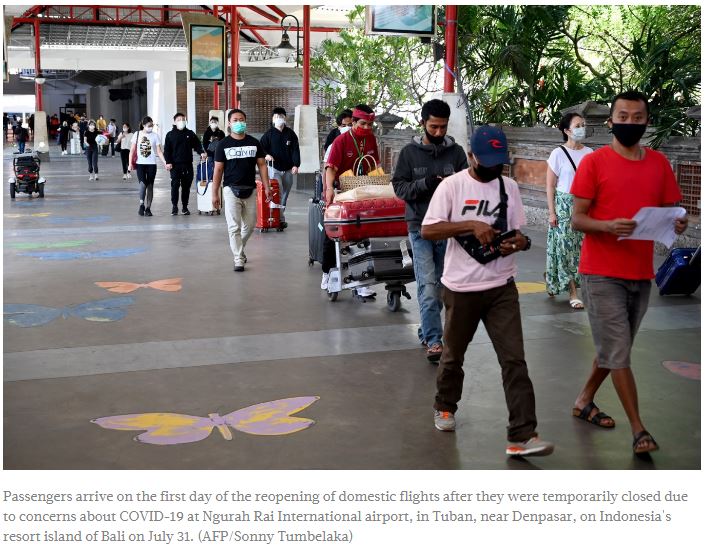Indonesia second most confident in Southeast Asia about reopening tourism, study finds
Indonesia is the second most confident nation in Southeast Asia about reopening its tourism sector with 71 percent of Indonesians saying their country is well prepared, a recent survey shows.
The result is part of a joint survey conducted by social research agency Blackbox Research, data provider Dynata and translation company Language Connect, titled Unravel Travel: Fear & Possibilities in a Post Coronavirus (COVID-19) World, that examines the sentiments, preferences and expectations of around 10,000 people in 17 countries regarding travel in a post-COVID-19 world.
Overall, Indonesia’s travel confidence score stands at 65 out of 100, higher than the global average of 61. Indonesia trailed behind neighboring Thailand.
“Our study has reinforced the fact that international tourism is a crucial pillar for Indonesia’s economy. Most operators are ready to restart, with safety and cleanliness protocols firmly in place,” Blackbox Research’s chief operating officer Saurabh Sardana said in an official statement on Thursday.
Tourism is among the sectors hit hardest by the coronavirus outbreak as people stay at home and limit travel to avoid catching the virus. The pandemic so far has taken away around Rp 85 trillion (US$5.87 billion) from Indonesia’s tourism revenue so far this year, according to data from the Indonesian Hotel and Restaurant Association (PHRI).
In a bid to aid tourism’s recovery during the pandemic, Health Minister Terawan Agus Putranto signed on June 19 a decree on health guidelines for public facilities, including hotels, restaurants, and tourist destinations, among others.
Indonesians optimism regarding travel also provides a favorable outlook for the country’s tourism destinations such as Bali, which recently reopened its borders for domestic tourists last week and plans to welcome foreign tourists on Sept. 11.
As Bali reopened for domestic tourists on July 31, an estimated 4,000 passengers reportedly arrived at I Gusti Ngurah Rai International Airport. A representative of the Airport Authority Office Area IV, Puguh Lukito, said that Ngurah Rai airport served 28 takeoffs and 28 landings on the day.
With tourism suffering a huge decline, the majority of Indonesians expect the government to boost its promotional efforts to attract tourists as they understood the importance of tourism to the country’s overall economy, the survey data showed.
According to the survey, 96 percent of Indonesian respondents’ regard tourism as an important contributor to the local economy, the highest percentage globally.
However, while local sentiment about restarting tourism has been encouraging, Indonesia could face challenges in regaining travelers’ trust given that Indonesia has recorded the highest number of confirmed COVID-19 cases in Southeast Asia, according to Sardana.
“Bali’s reopening will be the litmus test for Indonesia, and will greatly influence the country’s efforts to reinvigorate tourism as a whole,” Sardana said.
“The Indonesian government will need to play a key role in convincing travelers from around the world that it is safe to travel to their desired destinations.”
As of Wednesday, Indonesia had recorded 116,781 cases of COVID-19, with 73,889 recoveries and 5,452 fatalities.
National Development Planning Minister Suharso Monoarfa said on Tuesday that Bali was safe to visit and the local administration and businesses were taking unprecedented steps to prevent COVID-19 transmission.
“While we should remain vigilant with regard to the virus, we shouldn’t be paranoid. It is safe to visit Bali, but please adhere to the health protocols implemented on the island,” he said during an online discussion held by the ministry.
He also urged tourists to take a polymerase chain reaction (PCR) test prior to their visit to Bali, although the island accepts rapid test result as a requirement to enter.
Source: https://www.thejakartapost.com/news/2020/08/06/indonesia-second-most-confident-in-southeast-asia-about-reopening-tourism-study-finds.html


 English
English




